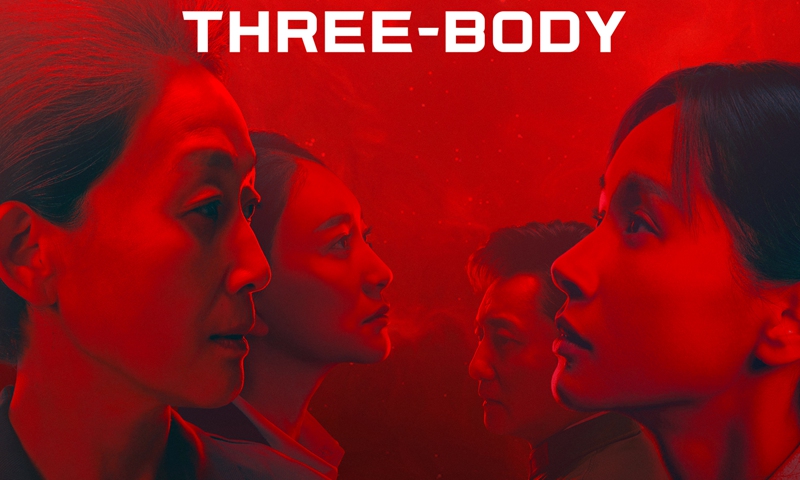
A poster of the Three Body TV series Photo: Courtesy of Tencent Video
As a viewer who has read the original novel and watched Netflix's adaptation of
The Three-Body Problem, my biggest takeaway is that Netflix should have more confidence in this marvelous Chinese science fiction novel and in global audiences. Although it's the first season, the eight episodes cover much content, making it overly complex and leaving little room for viewers to ponder. In an era dominated by micro-dramas, the abundance of twists in these eight episodes almost exhausts many classic elements from the latter two books of the trilogy, including the Staircase Program, and even the Wallfacer project, leaving viewers concerned about what more exciting elements the next season could offer. When the Wallfacers were already confirmed in the eighth episode, I couldn't help but feel that Netflix was rushing.
While many people blame the two creators David Benioff and D.B. Weiss, former showrunners of HBO's
Game of Thrones, the final decisions ultimately lie with Netflix's decision-makers. Perhaps they should take a page from
Dune. The
Dune film series has been hugely successful, with the director not hastily revealing all the excitement in one film but slowly shaping the world across two installments, resulting in both films being box-office hits, with the
Dune sequel bringing the entire franchise past $1 billion worldwide. Sometimes success requires patience, something lacking in Netflix's approach.
Although this monumental production reportedly cost $20 million an episode to produce for a total budget of $160 million, a big number even for a Netflix sci-fi spectacle, its flaws are also evident, such as the obvious grammatical errors in young actor Ye Wenjie's Chinese lines, which may leave native Chinese speakers bemused.
Another major criticism from viewers is that Netflix's version of
The Three-Body Problem fails to successfully portray the author's cosmic perspective. The series feels more like a dramatic spectacle, or drama sci-fi than a scientific exploration. Yet, these are precisely the essence of the original novel and one of the reasons it is a titan in the science fiction genre. Thus, some Chinese viewers pointing out these views is justified.
However, some foreign media outlets, such as CNN and VOA, have deliberately highlighted the negative reviews from Chinese viewers, labeling it as nationalism and even dragging geopolitical factors into the discussion. This deviates from the normal scope of film reviews and constitutes a malicious attempt to steer the narrative.
The Three-Body Problem novel is a profound and weighty science fiction epic. Whether US TV can capture such heights is a concern for many loyal fans of the original novel, which is perfectly normal. Upon examining overseas social media platforms, I found that many overseas netizens, like their Chinese counterparts, have similar mixed reviews of the series. You can't expect everyone to have a unified opinion on an adapted work, so some foreign media outlets' malicious misinterpretations appear rather ludicrous, like "jesters." The fact that a TV series adapted from a novel has garnered such heated discussion is, to some extent, a testament to its success.
Nevertheless, the series has its merits, including its eye-popping special effects. Meanwhile, the "Oxford Five" connects the characters from the trilogy more closely, which might be more viewer-friendly for a television audience.
However, some actors' performances don't inspire confidence in the characters themselves. Among the "Oxford Five," only the actor portraying Cheng Jin, based on the character of Cheng Xin, truly embodies the brilliance of a physicist, while the other four lack that scientific aura. Additionally, the portrayal of Wallfacer Saul Durand, based on the novel's character Luo Ji, lacks depth; the expression on his face after he learns about the Wallfacers is merely one of shallow confusion, lacking the deeper nuances required to imagine his mature confrontation with the San-Ti, or Trisolarans in the novel. Hopefully, he'll deliver a more outstanding performance next season.
For faithful fans of the original work, I recommend Tencent's version, which later released as an abridged version. For those unfamiliar with the source material, Netflix's version should suffice without too much confusion and the story is fairly comprehensive.
Regardless, the adaptation of a Chinese science fiction novel is a successful example of Chinese science fiction literature going global, and I hope more people can experience the value of harmony and inclusiveness reflected in Chinese literature.
The author is a reporter with the Global Times. life@globaltimes.com.cn




